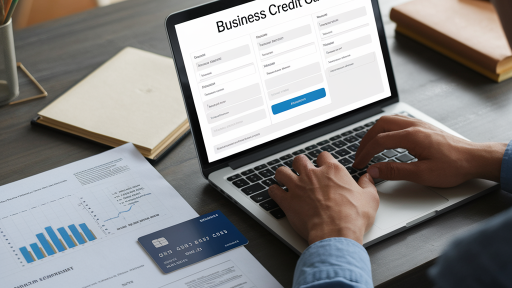For any entrepreneur, from a solo freelancer to the owner of a growing startup, managing finances is a critical balancing act. You’re constantly looking for tools that can simplify operations, improve cash flow, and provide a competitive edge. This is where the business credit card enters the conversation, often presented as an essential part of the modern business toolkit.
But with every financial product comes a crucial question: is it truly a benefit, or just another liability waiting to happen? Deciding whether to open a business credit card isn’t just about accessing a new line of credit; it’s a strategic decision that can impact your company’s financial health, legal structure, and future borrowing power. This guide will break down the compelling advantages and significant risks to help you determine if a business credit card is worth it for your unique situation.
Understanding the Core Function of a Business Credit Card
At first glance, a business credit card looks and functions just like a personal one. You can use it to make purchases online or in-store, and you’ll receive a monthly statement with a minimum payment due. However, the underlying structure and purpose are fundamentally different, and understanding these distinctions is the first step in making an informed choice.
How is it Different from a Personal Card?
While both are plastic rectangles that enable spending, they operate in different financial ecosystems. A personal card is tied directly to you as an individual and your Social Security Number, impacting your personal credit history. A business card is linked to your business’s Employer Identification Number (EIN), with the primary goal of building a separate financial identity for your company.
Here’s a breakdown of the key differences:
| Feature | Business Credit Card | Personal Credit Card |
|---|---|---|
| Primary Identity | Linked to Business EIN (Employer Identification Number) | Linked to Personal SSN (Social Security Number) |
| Credit Reporting | Reports to business credit bureaus (e.g., Dun & Bradstreet, Experian Business) | Reports to personal credit bureaus (e.g., Experian, Equifax, TransUnion) |
| Credit Limits | Often higher, based on business revenue and credit profile | Based on personal income and credit history |
| Rewards & Perks | Tailored to business spending (e.g., office supplies, advertising, shipping) | Tailored to consumer spending (e.g., groceries, gas, dining) |
| Legal Protections | Fewer consumer protections under the CARD Act of 2009 | Strong protections under the CARD Act (e.g., limits on interest rate hikes) |
The Compelling Advantages: Why a Business Credit Card is Worth It
When used strategically, a business credit card can be one of the most valuable financial tools at your disposal. It moves beyond simple convenience and becomes an integral part of your financial operations.
1. Separating Business and Personal Finances
This is arguably the most significant benefit. Commingling funds—using personal accounts for business expenses and vice versa—is a bookkeeping nightmare. It makes it incredibly difficult to track profitability, prepare for tax season, and understand your company’s true financial standing. A dedicated business card ensures all business-related expenditures are in one place, creating a clean, auditable record. This separation is also crucial for legal liability. If your business is structured as an LLC or corporation, keeping finances separate helps maintain the “corporate veil” that protects your personal assets from business debts and lawsuits.
2. Building Your Business Credit Score
Just as you have a personal credit score, your business has one too. A strong business credit score is essential for securing future financing on favorable terms. This includes small business loans, equipment leases, and lines of credit. Using a business credit card responsibly and making on-time payments is one of the most effective ways to establish and build this credit history. Without it, lenders will rely solely on your personal credit, which can limit your company’s growth potential.
3. Superior Cash Flow Management
Cash flow is the lifeblood of any business. A credit card provides a revolving line of credit that can act as a short-term, interest-free loan if you pay the balance in full each month. This buffer is invaluable for managing uneven revenue streams or covering unexpected expenses without dipping into your cash reserves. For example, you can purchase necessary inventory or pay a vendor immediately, giving you 30-50 days before the cash actually leaves your bank account. This flexibility can prevent operational disruptions and allow you to seize opportunities as they arise.
4. High-Value Rewards and Perks
Business credit card rewards programs are specifically designed to benefit companies. Instead of earning extra points on groceries, you’ll find bonus categories for common business expenses like:
- Digital advertising (Google, Facebook ads)
- Shipping costs
- Office supply stores
- Software subscriptions
- Internet and phone services
These rewards can be redeemed for cash back, statement credits, or travel, effectively providing a discount on your operational costs. Many premium cards also offer valuable perks like airport lounge access, travel insurance, and extended warranties on purchases.
5. Simplified Expense Tracking and Employee Spending
Most business credit cards offer powerful online account management tools. You can categorize spending, generate detailed reports, and often integrate directly with accounting software like QuickBooks or Xero, which automates much of your bookkeeping. Furthermore, you can issue employee cards with individual spending limits. This empowers your team to make necessary purchases while giving you complete oversight and control, eliminating the cumbersome process of personal reimbursements.
The Potential Downsides: Risks to Consider Before Applying
While the benefits are clear, a business credit card also carries significant risks. Ignoring these potential pitfalls can lead to financial trouble for both your company and you personally.
1. The Personal Guarantee: Your Assets are Still on the Line
This is the most misunderstood aspect of business credit cards. For most small businesses and startups without an extensive credit history, issuers will require a “personal guarantee” from the owner. This is a legally binding agreement that states if the business cannot pay the debt, you become personally responsible for it. The corporate veil will not protect you. This means your personal assets—your home, car, and savings—could be at risk if the business fails and you’ve accumulated significant card debt.
2. Higher Interest Rates and Fees
Business credit cards are not always covered by the same consumer protections as personal cards, such as the Credit CARD Act of 2009. This can sometimes result in more volatile interest rates and less warning before penalty APRs are applied. If you carry a balance, the interest charges can be substantial and quickly erode your profits. You should also be aware of common fees, which can include:
- Annual Fees: Premium rewards cards often come with annual fees ranging from $95 to over $600.
- Late Payment Fees: Can be steep and may trigger a penalty APR.
- Foreign Transaction Fees: Typically around 3% of the purchase amount if you buy from international suppliers.
- Cash Advance Fees: A very expensive way to access cash, with high fees and immediate interest accrual.
3. The Risk of Overspending and Debt Accumulation
The convenience of a credit card can be a double-edged sword. Easy access to a high credit limit can tempt owners to spend beyond their means, confusing credit with cash on hand. It’s crucial to have a strict budget and use the card as a payment tool, not as a means to fund a business that isn’t generating enough revenue. Piling up debt on a high-interest credit card is one of the fastest ways to create a financial crisis for your company.
4. Impact on Personal Credit Score
While the goal is to build business credit, mismanagement can still harm your personal score. Many issuers report account activity, especially negative information like late payments or defaults, to the owner’s personal credit bureaus. Even if they don’t report regularly, the initial hard inquiry when you apply will affect your personal score. High utilization on a business card could also potentially be factored into your personal credit utilization by some scoring models, especially if the account is new.
Comparative Analysis: When Does It Make Sense?
The value of a business credit card depends heavily on your business type and stage. Let’s look at a few common scenarios.
| Business Scenario | Primary Benefit | Key Consideration |
|---|---|---|
| The Freelancer / Solopreneur | Clean separation of finances for easy tax filing and expense tracking. | Ensure revenue is stable enough to pay the balance in full each month. A no-annual-fee card is often best. |
| The Growing Startup with Employees | Building the business credit profile for future loans and managing employee spending with set limits. | The personal guarantee from the founder(s) is almost certain. Strong internal controls on card usage are vital. |
| The Established Small Business | Maximizing high-value rewards on significant operational spending and optimizing cash flow cycles. | Analyze spending patterns to choose a card whose reward categories offer the best return, justifying a potential annual fee. |
Making the Right Choice: Key Questions to Ask Yourself
Before you fill out an application, take a moment to honestly assess your business and your own financial habits. Answering these questions will guide you to the right decision.
- Is my business revenue consistent? Can you reliably cover the monthly statement balance to avoid interest charges?
- Do I have the discipline to keep it strictly for business? Mixing expenses defeats the primary purpose of the card.
- Will the rewards I earn outweigh the annual fee? Do a quick calculation based on your projected spending in bonus categories. If the math doesn’t work, look for a no-fee option.
- What is my primary goal? Are you trying to build credit, earn rewards, or manage cash flow? Your goal will determine which type of card is best.
- Am I comfortable with a personal guarantee? You must fully understand and accept the personal risk you are taking on.
Conclusion: A Tool, Not a Crutch
So, is a business credit card worth it? The answer is a resounding yes—if it is used responsibly as a strategic financial tool. The benefits of separating finances, building business credit, managing cash flow, and earning valuable rewards are undeniable and can provide a significant advantage for your company.
However, it is not a solution for a struggling business or a substitute for positive cash flow. The risks of personal liability and high-interest debt are very real. The key is to treat it with discipline, paying the balance in full each month and using it to streamline operations, not to fund them. By carefully weighing the pros and cons against your specific business needs and financial discipline, you can make a choice that supports your company’s long-term growth and success. For more information from a trusted source, it is always beneficial to do your own research on understanding if a business credit card is worth it for your specific situation.




